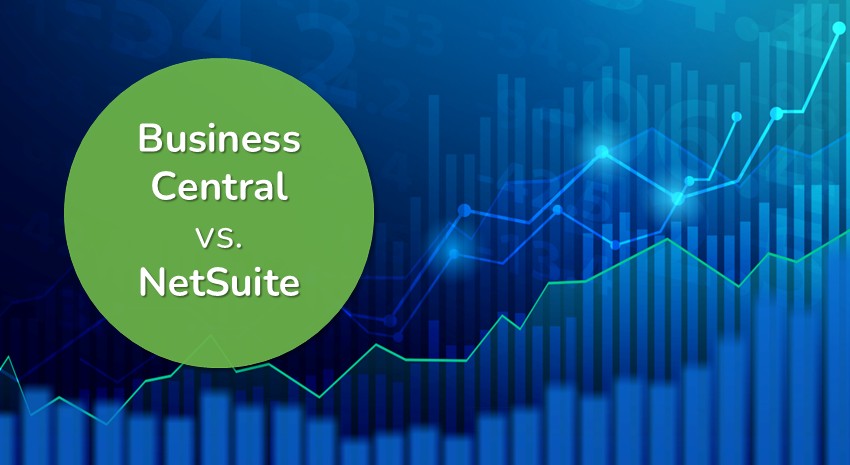Dynamics 365 Business Central vs Oracle NetSuite

In today’s rapidly evolving business landscape, choosing the right ERP system is crucial for maintaining competitive advantage and operational efficiency. Two of the leading solutions in the market are Dynamics 365 Business Central and Oracle NetSuite. This blog delves into a detailed comparison of these two powerful platforms, highlighting their unique features, strengths, and potential drawbacks. Whether you’re a small business looking to streamline operations or a large enterprise seeking robust functionality, understanding the differences between Dynamics 365 Business Central and Oracle NetSuite will help you make an informed decision tailored to your specific needs.
Comparing Dynamics 365 Business Central and Oracle NetSuite
When it comes to choosing an ERP system, businesses often find themselves comparing two of the most popular options: Dynamics 365 Business Central and Oracle NetSuite. Both platforms offer robust features, but there are key differences that can influence your decision
Pricing Structure
NetSuite‘s pricing includes a base fee, named user fees, and additional costs for advanced modules and service tiers. Business Central offers a more inclusive pricing model with fewer additional costs.
Subscription costs
Dynamics 365 Business Central offers a straightforward pricing model at $100 per user per month without additional base license fees. In contrast, Oracle NetSuite charges $99 per user per month plus a base license fee of $999 per instance per month, along with additional module costs and potential service tier upgrades.
Subscription features
Business Central includes all-in-one licenses that cover Finance, Sales, Service Management, Program Management, Manufacturing, and Supply Chain. NetSuite offers similar core functionalities but charges extra for advanced modules and features.
Last mile of functionality
Business Central benefits from a larger partner ecosystem with over 5,000 apps on Microsoft AppSource and 3,800 partners globally. NetSuite provides twenty industry-specific solutions and has a smaller ecosystem of 703 SuiteApps and 276 consulting and reseller partners.
Generative AI features
Dynamics 365 Business Central integrates Microsoft Copilot, offering a wide range of generative AI features that help turn data into actionable insights. Microsoft has invested over $6 billion in developing generative AI and has worked diligently to integrate these capabilities into all its business applications, including Business Central, Microsoft 365, Power Platform, Visual Studio, and Microsoft Azure. These features include auto-generation of product descriptions, late payment predictions, and AI-powered tools for finance and other business processes.
In contrast, Oracle NetSuite provides built-in AI functions and leverages Oracle’s AI capabilities in the Oracle Cloud Infrastructure (OCI). However, its generative AI capabilities are more limited, primarily assisting with long-text fields through its Text Enhance solution rather than offering comprehensive AI-powered assistance.
Artificial Intelligence
Business Central includes unique AI functionalities such as auto-generating product descriptions and late payment predictions. NetSuite references AI features like Predicted Risk predictions in orders, but these are available at an additional cost.
Deployment options
One important difference is that Business Central can be deployed on-premises or in the cloud, while NetSuite can only be deployed in the cloud. This limits a company’s options for hosting its own data and infrastructure.
Reporting capabilities
Both products have a full suite of customizable financial reporting functions that Power BI and add-on reporting tools can augment.
Microsoft interoperability
Business Central seamlessly integrates with Microsoft 365, allowing users to run end-to-end business processes within Outlook and collaborate using Teams without needing separate licenses. NetSuite offers basic Outlook and Excel integration but lacks support for Teams or OneDrive.
Process automation
Business Central leverages Power Automate for streamlining tasks and business processes with over 1,000 connectors. NetSuite‘s SuiteFlow is limited to creating and executing workflows within its own environment.
Extensibility
Business Central allows easy integration with Power Apps, Dataverse, and industry-standard development tools like VS Code and GitHub. NetSuite offers developer tools like SuiteScript and SuiteFlow but lacks a low-code app-building tool.
Built on Azure
Business Central is built on a common platform across Dynamics 365 and Microsoft 365 and offers a 99.9% SLA. NetSuite runs on Oracle Cloud Infrastructure and has a 99.7% SLA but does not share administration with other Oracle products.
Customer base
Business Central boasts over 40,000 customers, slightly edging out NetSuite, which has over 38,000 customers.
| Feature | Dynamics 365 Business Central | Oracle NetSuite |
|---|---|---|
| Cost | $100/user/month | $99/user/month + $999 base fee |
| Generative AI | Microsoft Copilot, $6B AI investment, integrated across Microsoft apps | Built-in AI, Oracle AI in OCI |
| Customers | 40,000+ | 38,000+ |
| Subscription | All-in-one licenses | Core functions, extra charges for advanced modules |
| Functionality | 5,000+ apps, 3,800 partners | 703 SuiteApps, 276 partners |
| AI Features | Product descriptions, payment predictions | Predicted Risk (extra cost) |
| Microsoft Integration | Seamless with Office, Teams | Basic Outlook and Excel integration |
| Automation | Power Automate, 1,000+ connectors | SuiteFlow (internal workflows) |
| Extensibility | Power Apps, Dataverse, VS Code, GitHub | SuiteScript, SuiteFlow |
| Platform | Azure, 99.9% SLA | Oracle Cloud, 99.7% SLA |
| Pricing | Annual subscription per user | Base fee, user fees, module costs |
NetSuite claims against Business Central
NetSuite claims that Business Central has limited revenue recognition capabilities, requires external tools for multi-subsidiary consolidations, and has limited prebuilt reports. However, Business Central has made significant investments in these areas, offering robust multi-company functionality, enhanced reporting and analytics, and extensive customization options.
Find out for yourself
In the end, no single ERP is ideal for every business. Prospective buyers should perform due diligence and select the ERP that meets their unique needs and budget.
While NetSuite provides a capable ERP for SMBs, we believe Business Central delivers a more flexible and affordable alternative.
Contact ArcherPoint to see what Business Central can do for your company.
Trending Posts
Stay Informed
Choose Your Preferences
"*required" indicates required fields
